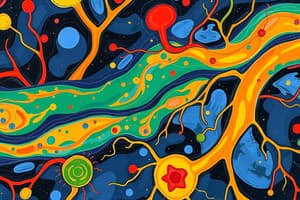Podcast
Questions and Answers
Which hormone is produced by the Beta cells of the pancreas?
Which hormone is produced by the Beta cells of the pancreas?
- Cortisol
- Calcitonin
- Insulin (correct)
- Aldosterone
What type of epithelium lines the trachea?
What type of epithelium lines the trachea?
- Ciliated pseudostratified columnar epithelium (correct)
- Transitional epithelium
- Non-keratinized stratified squamous epithelium
- Simple cuboidal epithelium
Which structure in the brain produces cerebrospinal fluid?
Which structure in the brain produces cerebrospinal fluid?
- Arachnoid matter
- Pia mater
- Choroid plexus (correct)
- Oligodendrocytes
What is the function of the zona glomerulosa in the adrenal gland?
What is the function of the zona glomerulosa in the adrenal gland?
Which cell type is primarily found in the CNS and is responsible for myelination?
Which cell type is primarily found in the CNS and is responsible for myelination?
Flashcards
What are beta cells responsible for?
What are beta cells responsible for?
Beta cells are found in the pancreas and are responsible for producing and secreting insulin, a hormone that regulates blood sugar levels.
What is the function of the zona glomerulosa?
What is the function of the zona glomerulosa?
The zona glomerulosa is a layer in the adrenal cortex. It produces the hormone aldosterone, which plays a key role in regulating blood pressure and electrolyte balance.
What is the role of the pineal gland?
What is the role of the pineal gland?
The pineal gland is located in the brain and produces melatonin, a hormone that helps regulate sleep-wake cycles.
What is the function of hepatocytes?
What is the function of hepatocytes?
Signup and view all the flashcards
What is the main purpose of the epidermis?
What is the main purpose of the epidermis?
Signup and view all the flashcards
Study Notes
Endocrine Glands and Hormones
- Beta cells produce insulin
- Zona glomerulosa produces aldosterone
- Pineal gland produces melatonin
- Pancreas produces somatostatin and insulin
- Kidney produces calcitriol and renin
- Thyroid produces calcitonin
- Ovaries produce estrogen
- Adrenal gland produces cortisol
Other Tissues and Their Components
- Liver: Composed of hepatocytes
- Blood: Contains erythrocytes
- Epidermis: Consists of keratinocytes
- Areolar connective tissue: Contains fibroblasts
- Bone: Formed by osteoblasts
- Brain: Contains oligodendrocytes
- Bone marrow: Contains megakaryocytes
- Lymph nodes: Have dendritic cells
- Taste buds: Stimulated by facial, vagus, and glossopharyngeal nerves
Fluid and Nervous Tissue
- Cerebrospinal fluid: Produced by the choroid plexus, reenters the bloodstream via arachnoid granulations
- Central nervous system (CNS): Contains oligodendrocytes, microglia, and ependymal cells
- Action potential steps: Dendrites receive signals, AP reaches axon hillock, AP propagates along axon, AP causes secretion
Pituitary Gland and Hypothalamus
- Anterior pituitary: Receives hormonal signals from hypothalamus; produces growth hormone, prolactin, thyroid-stimulating hormone, FSH, and LH
- Pituitary gland: Produces FSH
- Hypothalamus: Produces GRH
- Corpus luteum: Produces testosterone
- Enteroendocrine cells: Produce gastrin
- Fertilized oocyte: Produces hCG
Nervous System Organization
- Gray matter: Contains motor neurons
- White matter: Contains sensory neurons
Meninges
- Pia mater: Contains blood vessels
- Arachnoid mater: Forms a mesh
Epithelial Tissues
- Oral cavity: Lined by non-keratinized stratified squamous epithelium
- Cutaneous membrane: Covered with keratinized stratified squamous epithelium
- Alveoli: Composed of simple squamous epithelium
- Proximal convoluted tubule: Composed of simple cuboidal epithelium
- Trachea: Lined by ciliated pseudostratified columnar epithelium
- Urinary bladder: Lined by transitional epithelium
Studying That Suits You
Use AI to generate personalized quizzes and flashcards to suit your learning preferences.
Description
This quiz covers the various endocrine glands and the hormones they produce, such as insulin from beta cells and aldosterone from the zona glomerulosa. Additionally, it examines other tissues and their components, addressing the roles of cells in organs like the liver, brain, and bone. Test your knowledge of the relationships between glands, hormones, and the body's cellular structures.



